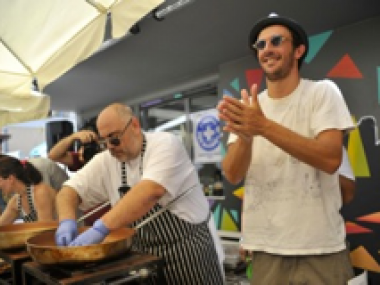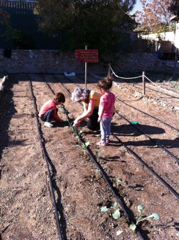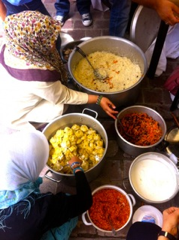Athens, an URBACT Food Metropolis
Edited on
09 October 2017From a city with 0% food self-sufficiency ratio to introducing food policy as key priority in the political agenda, Athens has come a long way. Learn how they got there and how URBACT helped them in doing that!

Athens, a historic city that turned into a modern metropolis: what about its food culture?
Athens is a unique European urban metropolis. With a history of more of than 3,000 years, it also forms one of the densest urban areas in the EU with many particularities and challenges to face. Lately, Athens is in the worldwide media spotlight because of the impacts of the severe financial crisis Greece has been facing. Regarding its population profile, one has to keep in mind that the municipality of Athens only concerns a core area of the city center, hosting 660,000 inhabitants. The wider metropolitan area includes almost the whole region of Attica with 58 municipalities and a population which is estimated at 3.75 million in 2014. If the nearby satellite cities of Chalkida, Thiva and Corinth are included in the metropolitan area then the total population reaches a much higher number, creating a unique situation as nearly half of the population of Greece is hosted here. The impact on transport demand, energy networks, housing, logistics and food supply are obviously very important. During the past two decades Athens has also witnessed an explosion of immigrant population. Hence, it nowadays hosts all – maybe with a few exceptions – civilizations and nationalities of the world, a fact that has transformed Athens into an authentic metropolis.
Concerning the food production, urban sprawl has reduced agricultural land in Attica and has especially affected certain districts. For instance, Mesogheia, an area in Eastern Attica, which used to be a center of agricultural production, is now hosting the new E. Venizelos airport, a project that has created pressures for housing and business land uses. Similarly, Thriasio Pedion in Western Attica, which was an agricultural area as well, has been transformed into a logistics and industry area, eliminating agricultural production. As a consequence, Attica and Athens are importing agricultural products either from rural Greece or abroad. Athens in particular has no agricultural production, and as a city it has achieved a0% food self-sufficiency ratio.
With regards to the demand, Greeks in general, and Athenians in particular, have moved away from the traditional Mediterranean diet which is connected to well-being and health, and follow the contemporary “global” diet. According to Giorgos Keranis, food expert and collaborator of the Athens Development and Destination Management Agency, “within the last 35 years, households have completely changed their nutrition patterns moving away from traditional Greek diet towards a westernized diet based on meat, fat and ready-made food; for example meat household consumption per capita amounts to 4,5 kilos, instead of 1 kilo which was the case some decades ago. A vicious circle has thus been created where urbanization expelled agricultural production, food imports have ensued, and nutrition has changed due to supply constraints on the one hand and demand for imported “modern western” patterns on the other. Such a shift is evident in the restaurant and catering business as well, where it is difficult to find a complete menu prepared with local products and representing a genuine Greek diet.”
For these reasons, one would probably think that a discussion on food related initiatives in the city would not be well-received. Even more in times of crisis, since nutrition becomes a basic need rather than a thing to be ameliorated; still attitudes towards improving the procedures of growing, producing, distributing and consuming food seem to be gaining the attention of individuals, families, groups, organizations and food-related businesses in Athens.

Children looking after their vegetable garden at the Kindergarten of Plaka
The Municipality of Athens participates as project partner through the Athens Development and Destination Management Agency in URBACT “Sustainable Food in Urban Communities” network. Thanks to this involvement, challenges such as urban farming, nutrition, food education, food distribution and green jobs are discussed and dealt with progressively at local level.
Food is also the central element in the other two URBACT II networks where local government units from Athens are involved as partners. The Region of Attica project confronts the problems related to its open and closed food markets through its participation in the URBACT Markets network. Meanwhile, more recently, the Municipality of Korydallos started working on the notion of local gastronomy strategy through Gastronomic Cities.Athens greater area is poised to become an URBACT food metropolis. As there are many common challenges among these networks, the opportunities to combine steps and work together are expected to develop in the next period. Both Elpida Papadopoulou from the Region of Attica and Andreas Alexopoulos from the city of Korydallos agreed that URBACT has been a unique opportunity to develop partnerships. According to Elpida Papadopoulou “we are now discussing food related issues with more stakeholders – as members join each others’ Local Support Groups - which would not have been possible outside URBACT.”
Introducing food policy as key priority in the political agenda
Participatory decision making processes and citizens’ involvement in policy programming are weak in Greece, so creating trust among the stakeholders that would form the Local Support Group of Sustainable Food network was not the easiest first step. According to Dina Tsamourtzi from the Athens Development and Destination Management Agency of Athens, “at first many of the stakeholders’ representatives fell that ownership of their activities would be threatened, so for us it was an enormous challenge to be able gain their trust.” At the same time “sustainable food” policy is a newcomer into Greek reality, both at national and local government levels. It is thus a great challenge, essentially and symbolically, to introduce food policy in Athens since it is the capital of Greece. This requires to a great extent that municipal authorities get into food policy discourse, understand its importance and eventually adopt a framework for creating and implementing policy in a systematic way.
This is not to say that actions, or projects, are not being implemented by Athens Municipality, civil society and economic actors with regards to sustainable food. On the contrary, there are many activities taking place according to the themes and cross-cutting issues that Sustainable Food is trying to promote. For example, school vegetable gardens, Biowaste – a program aimed at composting food waste – food-support structures for the less privileged and permissions for the development of organic farmers’ markets in the city center (not implemented yet due to legislative subjective grey areas). Additionally, collective public cooking programs for the poor are organised and events that promote the local gastronomy; retail stores and restaurants shift their focus towards local products; academic efforts initiate a shift towards healthy nutrition; NGOs promote sustainable nutrition paradigms, in an effort to attract the attention of local and urban tourists.
However, two links are missing: (a) the connection between municipal authorities and civil society is still weak and (b) the link between the intention for a sustainable food system and the related actions. According to George Keranis “we need to reinforce participatory politics and promote an overall agrifood policy based on evidence, strategy and concrete targets and aims. The URBACT Method proves to be an exceptional tool in order to achieve such a well defined strategy. And since honesty is the best policy, there is a lot to be done to get there. We are still at the very beginning.”
Other ideas are still at an early planning stage within the Sustainable Food team, but could develop in major interventions; in some cases wider regeneration issues of the city are addressed. The creation of a municipal Urban Farm at Elaionas (a derelict brownfield area that lies between Athens and Piraeus) could trigger discussions about the regeneration of the whole area which is now characterized by social problems and deprivation. The identification of municipal properties that can be used as urban gardens is an activity that can create conditions for urban renewal. For example the creation of a vegetable and herb garden at the deprived Academy of Plato area after the soil has been revived could create conditions of neighborhood empowerment and has been positively received by its inhabitants. Furthermore, activities for the wider audience such as the organization of free courses in organic agriculture with the support of the Local Support Group members or the distribution of an “organic farming box/toolkit” for the creation of small urban gardens are being discussed.
Capacity building: creating a new understanding regarding food policy
Within the operation framework a group of key stakeholders had the opportunity to interact through the Local Support Group. The group membership has fluctuated but eventually it has grown. According to George Keranis “the initial attitude towards building the group was a risky one. We had to see clearly where we stand with regards to participatory politics and food policy. Hence Athens has started with a small experiment. The main idea was not to build a super-big and inclusive Local Support Group, but following URBACT methodology we went for a small functional one, with actors implementing certain best practices.” The next step was the risky part: giving a framework of reference with regards to food issues and policy in Athens, it was left to participants’ willingness to contribute in the best way they see fit. “As expected the results vary, however there is a significant element of innovation: participants decided themselves how they would participate and there have been no activities forced on to them. This offers a clear view where we stand with each of the participants, and where we can go with regards to actions and action-planning. As a first step, it seems more efficient to cooperate with those who are willing to contribute, rather than “forcing” everyone equally.”
After its initial phase, the group consists of stakeholders coming from various fields: organic farmers operating the organic farmers’ markets, the Technological University of Piraeus, the Hellenic Gastronomy Museum, Organization Earth, NGOs dealing with sustainable development, the Municipal Radio Station, solidarity economy unions such as Alternative Trade Network, chefs, Gastronomos – a food magazine with the highest circulation in Greece – a Municipal Kindergarten in Plaka mostly active in environmental issues and municipality officials – from elected vice mayors to policy makers from different sectors. According to Dina Tsamourtzi, “their participation and willingness to work together were major inputs for the project and the atmosphere has been positive; that doesn’t mean that there are no threats for the future, we need to offer a clear ground for action.” The experience of the other cities facilitated the learning process: Brussels as a lead partner, Lyon and Amersfoort but also cities like Messina that are facing the same Southern European political context, have been an important inspiration for the members of the Athens LSG.
June 2014: Combining URBACT powers in an event
As mentioned, Athens is the center of three URBACT food-related programs that focus on food and, after their members had met during the national seminars, it was only a question of time until ideas for synergies would be implemented. June 27th, three URBACT partners – Athens, Korydallos and the Region of Attica – met at the front entrance of the historical “Varvakeios” Athens Central Market to celebrate the event which was given the name “Athens, Metropolis of Taste.” The event took place on occasion of the “Declaration for the International Days of Markets” as advanced by URBACT Markets partners. It was hosted in the Synathina premises on the opposite of the market’s entrance, a space that is open for temporary uses by citizens’ groups and NGOs. as a public platform for engaged citizens (the Synathina project being one of the 5 winners in the Bloomberg City Challenge). Each one of the three URBACT partners participated in the event with some kind of activity.

Preparing traditional dishes from Afghanistan outside the Varvakeios Market
Four well-known Greek chefs who are operating restaurants that use organic and quality local products in their kitchens coordinated the event. In addition, representatives of ethnic communities of Athens were asked to participate; the “Nigerian Women’s Association” and the “Afghanistan Immigrant and Refugee Association” cooked and offered traditional recipes during the event, getting the Athenians acquainted with their gastronomic culture. In this way the idea that taste can unite and befriend different groups of the city center was promoted, thus focusing on sustainability, social inclusion and the variety of food cultures in Athens. At the same time, visitors were informed about the three URBACT networks. There was national media coverage (and social media), participation from the citizens and a festive atmosphere. The Sustainable Food project in particular welcomed a number of visitors who expressed interest concerning the program content and the participative bottom-up methodology. At the same time several visitors related to the food sector were interested in participating in the Local Support Group. As a result, new stakeholders were added to the LSG, such as the food magazine Gastronomos and participants coming from the civil society and the private sector. The event is expected to positively effect the elaboration and promotion of the Local Action Plan. Kleomenis Zournatzis, a chef and member of the ULSG who cooked during the event, was impressed by its impact. “While these types of initiatives are a major trend in many metropolitan areas worldwide, it is not so common in Athens. It is great to see that we are catching up and to be part of it.”
A food network which is here to stay
What about the next steps? Starting a conversation about food policy was already a huge step, but will these initiatives continue? According to Giorgos Keranis the Sustainable Food network brought some fresh ideas to the city: “Visiting partners cities like Lyon and Messina and talking to chefs, urban farmers, organic food shop owners and school teachers who are involved in local projects was an inspiration as these cities have very innovative approaches. The URBACT Local Support group was formed at a crucial point and helped a lot towards capacity building. “It seems that this was the right moment to start this discussion. Most importantly, as the LSG members started getting more and more interested in the activities and as Sustainable Food started getting more publicity, the doors of the policy makers opened. They begin to understand that this can be a unique opportunity for a long-term local food policy that will have an impact on the city,” says Keranis. Obviously, certain proposed interventions have an educational and symbolic purpose. For example urban farming cannot cover the needs of Athens nor is it possible to compete commercial farming methods; changing the food production and distribution model needs a wider approach and a change of attitude.
The operation of the LSG has also pushed the local government stakeholders to include elements of food policy in their mainstream programming (through the Integrated Urban Intervention Plan which was carried out by the Municipality of Athens) and to consider using the outcomes of Sustainable Food as a priority in the new Partnership Agreement of Attica Region (it might lead to a Community Led Local Development Initiative within Attica’s ITI). The project can have a profound effect on the way the younger generation understands sustainability in food production and distribution and adopt different attitudes towards food. Empowering the partnerships and keeping relations of trust strong among stakeholders is therefore a key challenge.
Read more:
Sustainable Food in Urban Communities - URBACT website
Sustainable Food in Urban Communities Blog - Project blog
URBACT Markets - URBACT website
Gastronomic Cities site - URBACT website
Mayors challenge 21 finalists– Bloomberg (Synathina Project Athens) - Website
 Submitted by Simina Lazar on
Submitted by Simina Lazar on
